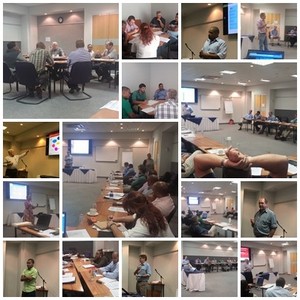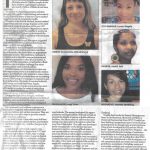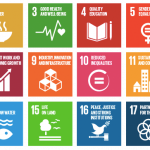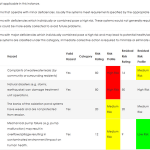Municipal Benchmarking continues to gain momentum


Water Services Master Class (WSMC) 4 was hosted February and March 2015 in Durban, Bloemfontein and Stellenbosch, and attended by 126 persons (excluding the MBI team). Municipal participation in this WSMC was 78% of total attendance (i.e. 98 persons). In particular attention is drawn to District and Local municipal participation, with Durban having 60% participation by DMs, Bloemfontein having 51% participation by LMs, and Stellenbosch having 55% participation by LMs.
Main touch points of the WSMC 4 included: (1) Water Services Vulnerability (MuSSA) – Do you agree with your key vulnerabilities? How have peers overcome chokepoints in addressing these? (2) MBI Scorecard – are your PI targets best aligned to sector requirements, e.g. National Treasury’s Standard Chart of Accounts (SCOA)? (3) Water Services League – Do you agree with your status? Can it guide future Peer Learning? (4) SCOA – Does SCOA provide opportunity for our water services business? How can water services best approach SCOA? WSMC feedback obtained showed that the general sentiment from municipal participants was overwhelming positive in terms of content and professional development. The project team aims to build on this success and continue to produce MBI events that both interest municipalities, and help them improve performance.
 The South African Local Government Association (SALGA) and Water Research Commission (WRC) re-established water services benchmarking in South Africa through the national Municipal Benchmarking Initiative (MBI) for Water Services in April 2011. Key aspects of the MBI approach include: (1) Peer Group Meetings/Workshops, (2) Water Services Master Classes (WSMCs), (3) National Conference/Workshop, (4) Data management, data analysis and associated reporting, including Municipal Scorecards, Annual National MBI Report and Water Services League Report, (5) Munibench, and (6) Sponsor support, Promotion and Sector Alignment. Amongst the benefits of benchmarking and of knowing how a municipality’s own performance compares to that of its peers is that it flags strong performers in particular areas, which forms a source of learning and information sharing. How this information is then shared among peers is important to facilitate that municipalities see the benefit in their participation and in the effort committed to the process. Extensive efforts are made to share and disseminate information widely and responsibly in support of improved service delivery and sector collaboration, through, for example, inputs and presentations at sector events, seminars, workshops, conferences, and newspaper, magazine and journal articles.
The South African Local Government Association (SALGA) and Water Research Commission (WRC) re-established water services benchmarking in South Africa through the national Municipal Benchmarking Initiative (MBI) for Water Services in April 2011. Key aspects of the MBI approach include: (1) Peer Group Meetings/Workshops, (2) Water Services Master Classes (WSMCs), (3) National Conference/Workshop, (4) Data management, data analysis and associated reporting, including Municipal Scorecards, Annual National MBI Report and Water Services League Report, (5) Munibench, and (6) Sponsor support, Promotion and Sector Alignment. Amongst the benefits of benchmarking and of knowing how a municipality’s own performance compares to that of its peers is that it flags strong performers in particular areas, which forms a source of learning and information sharing. How this information is then shared among peers is important to facilitate that municipalities see the benefit in their participation and in the effort committed to the process. Extensive efforts are made to share and disseminate information widely and responsibly in support of improved service delivery and sector collaboration, through, for example, inputs and presentations at sector events, seminars, workshops, conferences, and newspaper, magazine and journal articles.
Peer networks are encouraged to start small (low hanging fruit), learn and build upon successes. The Water Services Master Classes (WSMCs) have been a very successful platform for peer learning and establishment of peer networks. The WSMCs aim to draw from local case studies and better practices, with an emphasis on “practitioner to practitioner” exchange. Key elements of the WSMCs include: (1) Free participation by all, (2) Technical overviews, (3) Case studies, (4) Best practices, (5) Share common issues/challenges faced, (6) How did they do that?, (7) Performance measurement (PIs), and (8) Networking. All municipalities (regardless of maturity of participation level) are invited to attend these benchmarking events.
If you would like to participate in the MBI and future WSMCs, or would like further information please contact us.












